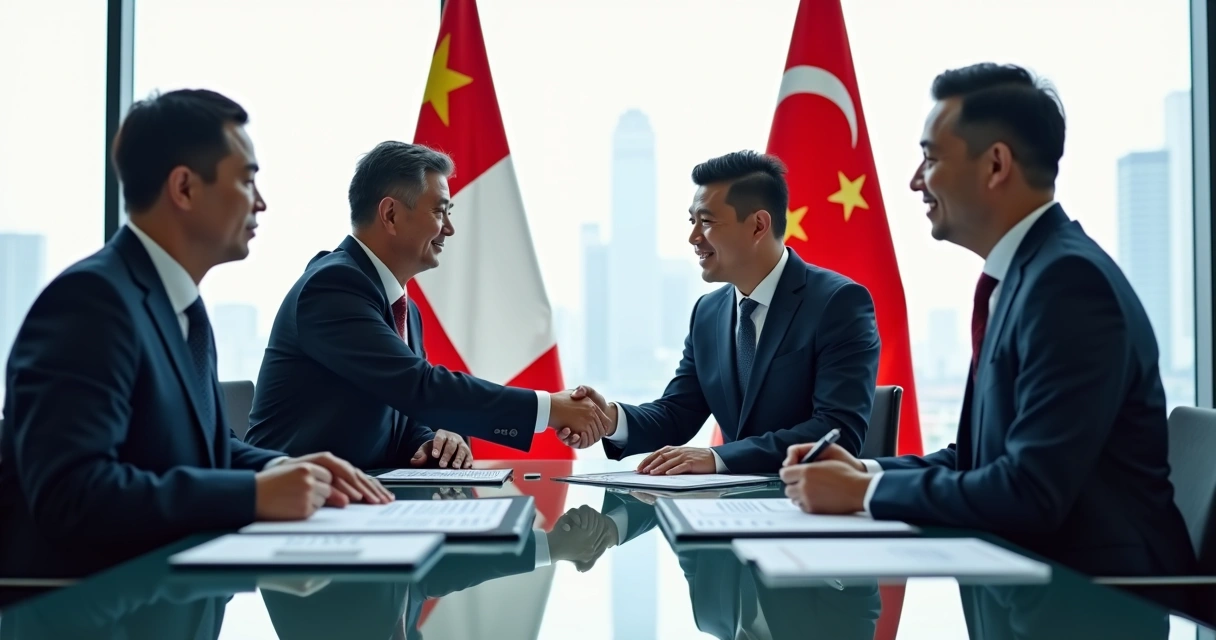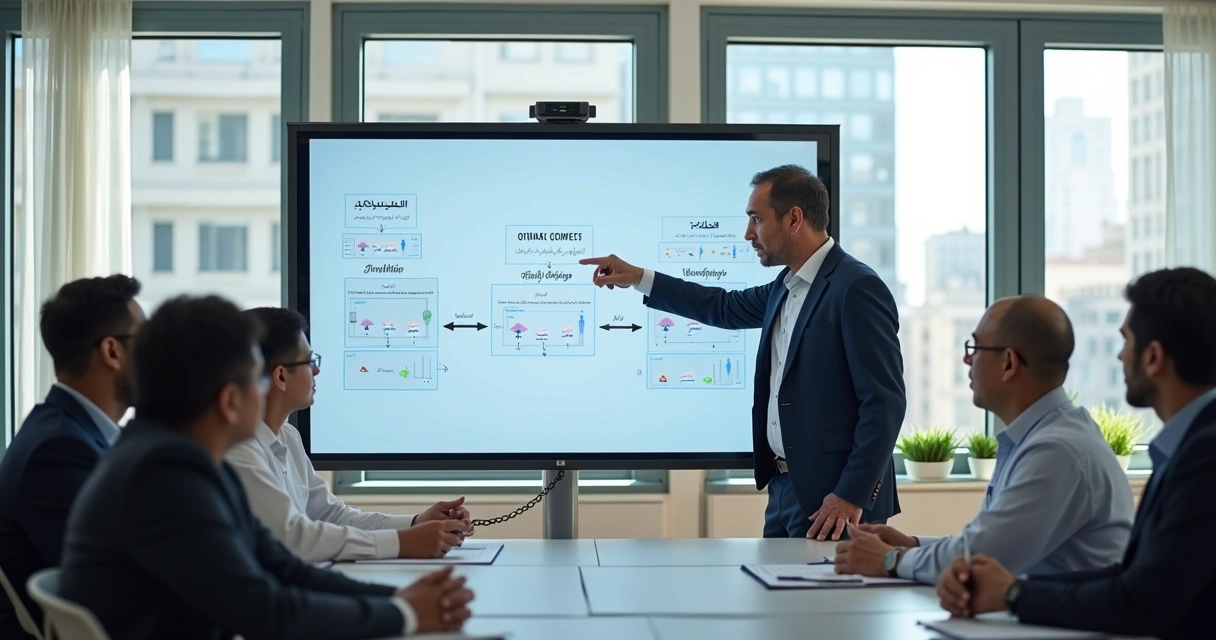When I first heard about the scale of the project—an established Chinese mining state-owned enterprise aiming to set up in Oman—I knew this would be a journey marked by unpredictability. I’ve seen how companies, especially in high-stakes sectors like mining, can stall at the border of new markets simply because the rules on hiring, payroll, and day-to-day compliance change so wildly from one country to the next. Today, I want to break down the real story: how Enterprise Workforce Solutions (EWS) was at the center of this project, helping this Chinese mining SOE move from early plans on paper to real operations in Oman.
I remember my first sit-down with the project leads. They shared their ambition: to expand operations outside China and take advantage of Oman’s resource-rich environment and growing GDP, which was $106.94 billion in 2024. From my own research, Oman’s government has invested heavily in logistics, renewables, and mining—a move highlighted in the IMF’s 2025 press release about economic growth projections reaching 3.7% by 2026.
But this ambition ran into reality quite suddenly. Oman isn’t just “open for business;” it has unique labor laws, fluctuating wage expectations, specific rules about foreign workers, and its own business setup processes. The urgency was real. The Chinese team needed to hire qualified engineers, geologists, local compliance specialists, and support staff—and every mistake in hiring would end up as either a compliance fine or a critical project delay.
 The first roadblock: Hiring and compliance confusion
The first roadblock: Hiring and compliance confusionI clearly remember the project manager’s frustration. He felt like every document his team prepared for Omani authorities was missing a piece—an approval, a stamp, or an official translation. Even the basic act of hiring a geologist meant figuring out whether the employment contract needed to be in Arabic, English, or both, and which entities had to review it. Add to that the question of pay parity for local and expatriate workers. In reality, Oman’s labor market presents more than just linguistic and bureaucratic barriers.
Based on an IMF analysis, the country’s labor market is segmented between public and private sectors, with wage gaps and limited upskilling discouraging nationals from private sector work. The real test for a foreign business, I saw, was not just regulatory—it was social and cultural, too.
I’ve seen even experienced HR Directors and global mobility managers hesitate when faced with such a maze.
Even the most confident teams can lose days unraveling how “simple” employment works in a new country.
At this point, the project turned to us at EWS. They’d heard we could connect the dots—”simplifying global hiring and local compliance,” as I sometimes like to sum it up. Drawing on our history helping companies employ staff in China and our reputation across the Middle East, we offered to become their single point of contact in Oman, handling everything from company formation to ongoing payroll.
I know some in the industry talk about process engineering or global mobility in abstract terms. For us, “enterprise workforce solutions” only matter if they actually get people working under contract, legally and on time. That was the promise we made. And here’s how we started.
Correct compliance is invisible. Errors are loud.
There’s a special pressure when bridging two vastly different regulatory worlds. In my experience, misunderstanding a single clause—say, about pension contributions or minimum wage—can turn into an expensive lesson. I felt a certain responsibility, knowing this SOE’s leadership could not afford scandal or delay.
Oman ranks 48th on the World Bank’s Logistics Performance Index (LPI), showing it is a good place for international trade, but only if you understand the “how” of moving goods and people. Our EWS approach isn’t just template contracts—it’s having real people in Oman who know the ministries, and who can read the subtext behind an official document.
Before our engagement, the SOE’s HR partner faced these recurring blockers:
Through EWS, they gained a workflow where paperwork was submitted right the first time, with local review and translation handled in parallel. It truly changed the pace.
 Payroll and contracts: Getting the basics right
Payroll and contracts: Getting the basics rightPayroll in Oman isn’t a matter of simply multiplying hours by rate. The scheme must integrate pension contributions for nationals, expatriate insurance requirements, paid holiday calculations for both Fridays and religious festivals, and currency conversion without error. I designed a localized payroll cycle that synced head office reporting in RMB and Omani Rial, with real-time tax updates and clear audit trails.
On contracts, we tailored bilingual agreements, always double-checked for their compliance with both Omani standards and Chinese SOE auditing expectations. This avoided confusion and removed any gray areas about working hours or benefits.
Even small details, like end-of-service calculations, made a huge difference in trust.
Technical compliance was one thing—the human element was another. I saw some cultural stumbles early on. Workweek styles differed, and the rhythm of project management shifted around local working hours and practices. Beyond that, the SOE leadership learned firsthand how important it was to build trust with local partners and authorities.
Skills transfer mattered, too. Oman’s labor laws encourage hiring of local Omanis, so we balanced the team accordingly. EWS—not just as a provider, but as an advisor—helped set up local training for Omani staff, bridging language gaps and supporting skills development on both sides.
In my observation, this was the turning point. When you work with local expectations (rather than against them), projects find their pace and rhythm. Saudization lists, local sponsorship rules, public holidays—these weren’t sources of stress anymore. They became part of regular operations.
 Measuring growth: The real outcomes
Measuring growth: The real outcomesIf I look back at hard numbers, Oman’s GDP per capita in 2024 was $20,248.4, with 1.7% real GDP growth, low inflation (0.6%), and only 3.2% unemployment, according to the World Bank and IMF. These macro facts tell their own story: this is an attractive place for mining investment if you get your setup right.
For the SOE, what did our work with EWS mean in the day to day?
The relief, I think, was visible whenever global C-levels visited the Oman site and saw operations running smoothly, staff paid on time, and no last-minute visa scares.
I sometimes get asked: why did EWS deliver where others stalled? My honest answer is this—our blend of local presence, tech-driven payroll, and a single-coordinator model unlocks results. By acting as the Employer of Record, we changed what could have become a slow, risky legal process into a system where hiring and project work start in parallel.
We saw morale rise fast. When headquarters staff understood that EWS, as their local employer, covered insurance, compliance, and on-the-ground fixes, it freed them to focus on the real work—mining and operations.
If you look at new workforce expansion, especially as examined in our resource on expanding your workforce globally, you’ll often see that speed and accuracy are what matter most.
In global growth, speed and certainty matter more than size.
My takeaway from this experience is surprisingly simple. Chinese companies, especially SOEs, can harness Oman’s opportunities. But the real trick is preparation. Understand the mix of laws, local norms, and operational barriers before investing money or time. I always recommend:
How Recruiters Use EOR to Handle Rapid Global Onboarding
Top 5 EOR Red Flags to Avoid in 2026
EOR vs Entity Setup in 2026: What Startups Need to Know
10 Things You Didn’t Know Your EOR Could Do
When to Use a Payroll Provider vs Full EOR in Global Hiring
January Compliance Watch: What’s Changing in APAC Labor Laws
Hiring in Turkey in 2026: Costs, Contracts, and EOR Options
Contractor or Employee? Compliance Risks to Watch in 2026
What’s Changing in European Payroll Compliance in 2026?
How to Use EOR to Win More Government or Public Sector RFPs
Hiring in Colombia: Fast-Growing Talent Pool, Low Total Cost
Remote Tech Jobs Surge 33% in Ireland: Skills You Need Now
Remote Work in APAC: 7 Data-Driven Trends for 2026 Expansion
Remote Payroll Headaches: 7 Mistakes HR Teams Make
Freelancer vs EOR in 2026: Cost, Risk, and Speed Compared
How Employee Experience Drives Retention and Business Growth
How HR Can Reduce Burnout Amid AI, Budget Cuts, and Change
Employment Contracts: What HR and Global Managers Must Know
PEO Explained: How It Simplifies Global Workforce Management
Global Mobility: A Complete Guide for HR and Global Managers
Remote Workforce: A Complete Guide to Managing Global Teams
Workforce Planning: A Step-by-Step Guide to Strategic Hiring
How Recruiters Use EOR to Increase Revenue Per Client
The Secret to Winning Global RFPs? A Strong EOR Partner
Top 7 Hiring Trends Shaping Global Teams in 2026
Hiring in Türkiye: Key Labor Laws and Employer Risks in 2026
GCC Hiring Compliance Update: What’s Changing in 2026
How to Hire in Turkey in 2026: A Strategic EOR Guide
Why modern recruitment agencies outsource compliance to EOR partners
How adding an EOR partner helps agencies win more RFPs
EOR Opportunities in Poland: Why It’s Europe’s Talent Powerhouse
Cross-Border Hiring Trends for 2026: Insights for Global Recruiters
How to Build a Scalable Payroll Strategy Across MENA
Contractor vs Employee in Germany: What’s the Risk in 2026?
“Place globally, bill locally” — the new recruiter cheat code
Top 5 Compliance Mistakes When Expanding to the UAE
Why EOR is Key to Winning Public Sector Tenders in Europe
Growth formula for agencies using EOR to expand key accounts
How EOR helps recruiters stay ahead of fast-changing GCC compliance
Employer of Record in Mandarin: What is 境外雇主服务?
How to Use an EOR for Temporary Projects (中国公司如何为短期海外项目使用EOR服务)
Why “Go Global” Must Include Compliance (“走出去”战略中的合规盲点)
中资企业如何选择欧洲EOR供应商?(How to Choose the Right EOR Partner in Europe)
与当地政府打交道:中国公司需要了解的合规礼仪 (Cultural Compliance for Chinese Firms)
中国公司海外人力结构案例分析:制造业、科技与能源 (HR Case Studies: Chinese Firms Abroad)
How Guanxi Influences Hiring in the Middle East (关系在中东招聘中的作用)
Top 5 Risks When Hiring in the Gulf (中国企业在海湾地区招聘的五大风险)
Managing Compliance in Multi-country Projects (中国企业多国项目的人力合规管理)
The $100K Visa Shock: Why Global Hiring Just Replaced the H-1B
How to Set Up Payroll For Hpc And Ai Teams
Contracting Machine Learning Talent Abroad
Everything on Hiring Foreign Phds In German Tech Labs
Cross-Border Ip Protection In R&D Teams
How To Classify Freelancers In Tech Innovation
How Eor Helps Tech Firms Legally Hire In Germany
Dual Contract Structure For International Researchers
Data Protection Obligations For Remote Tech Staff
Germany Research Visa Vs Skilled Worker Visa
Everything on Nis2 Directive Compliance For Eu Tech Workers
Global Mobility For Deep Tech Startups In Germany
Payroll For EU Embedded Systems Developers
Relocation Support For Semiconductor Experts on EU
The Absolute Way to Hire Ai Engineers In Germany
How to Manage Benefits For German Tech Hires
Germany’S Blue Card Process For Engineers
Everything on Germany R&D Employment Compliance
Remote Hiring Of Cybersecurity Analysts In Eu
Visa Pathways For Quantum Computing Researchers
Onboarding Robotics Specialists Across EU Borders
Workforce Planning In Ai-Driven Logistics And Infrastructure
Visa Processing For High-Tech Infrastructure Staff
Managing Global Mobility In Sustainable City Projects
Cross-Border Team Management In Saudi Data Centers
Hiring Skilled Labor For Green Hydrogen Facilities
Digital Twin Technology Hiring Trends In Saudi Construction
Employer Obligations In Public-Private Energy Initiatives
Navigating Local Labor Laws For Solar Energy Teams
Talent Acquisition In The Saudi Mining Sector
Eor Solutions For Ai Engineers In Mega Projects
Regulatory Challenges In Hiring For Giga Construction Projects
Contractor Compliance In Smart City Developments
Classification Of Engineering Consultants In Vision 2030 Projects
How To Manage Workforce For Neom-Based Tech Projects
Eor For Multinational Mining Firms Operating In Saudi Arabia
Employer Of Record For Wind Energy Projects In The Gulf
Relocation Logistics For International Clean Energy Experts
Hiring Strategies For Large-Scale Construction Projects In Ksa
How To Onboard Digital Infrastructure Experts In Saudi Arabia
Payroll Setup For Renewable Energy Workers In Ksa
Strategic Relocation To Riyadh Or Doha: A Guide for Global Employers
Work Visa Processing In Qatar And Saudi Arabia
Qatar Nationalization Policy And Foreign Firms
Cost Of Setting Up A Business In Qatar: A Guide for Global Employers
Saudi Labor Court And Dispute Handling for Global Employers
Cross-Border Payroll For Ksa And Qatar Teams
End Of Service Benefits Saudi Arabia: A Guide for Global Employers
How To Manage Expat Benefits In Qatar for Global Employers
Expanding Into New Markets: Vendor Risks You Should Flag
A Guide to Cross-Border Equity Vesting for Tech Startups
Employer Branding for Multinational Teams: What Works Now
What Global C-Level Leaders Miss About Digital Nomad Visas
Succession Planning for Distributed Teams: A Practical Guide
Relocation Budgeting For Global Tech Firms
Latam Hiring Strategy: What Global Companies Should Know
Risk Of Permanent Establishment Explained
Managing Intellectual Property In Remote Work
Benefits Benchmarking Globally for Global Companies
How to Benchmark Compensation Across 100+ Countries in 2025
Checklist: Preparing HRIS for Fast International Scalability
Biometric Data in Global Payroll: Legal Boundaries Explained
8 Regulatory Updates Impacting Global HR in 2025
What are Hidden Costs of In-House Payroll?
Why Companies are Thinking Differently About Relocation
Is Your Global Mobility Program Outgrowing Spreadsheets?
Remote Work Visas: A Growing Trend in Global Mobility
Hiring in Europe Post-Brexit: What You Need to Know
Tips for Managing Multi-Time Zone Teams Successfully
Relocation Packages: What Top Talent Expects in 2025
Banking and Payroll Challenges in Saudi Arabia Markets
The Legal Risks of Misclassifying Global Workers
Why Scalability Should Drive Your Global HR Strategy
How EWS Streamlines Global Mobility for Tech Talent
Lithuania – Employer of Record
Kosovo – Employer of Record
Finland – Employer of Record
Namibia – Employer of Record
Nepal – Employer of Record
Spain – Employer of Record
Latvia – Employer of Record
Ireland – Employer of Record
Cyprus – Employer of Record
Czech Republic – Employer of Record
Italy – Employer of Record
Indonesia – Employer of Record
South Africa – Employer of Record
Tunisia – Employer of Record
Bosnia – Employer of Record
Moldova – Employer of Record
Five Tips For Improving Employee Engagement
Netherlands – Employer of Record
Germany – Employer of Record
France – Employer of Record
Portugal – Employer of Record
Bulgaria – Employer of Record
Austria – Employer of Record
Hungary – Employer of Record
Slovenia – Employer of Record
INCLUSIVITY IN THE TEAM MAKES EVERYONE WIN
Thailand – Employer of Record
Sri Lanka – Employer of Record
The Significance of an Employer of Record
Greece – Employer of Record
Mexico – Employer of Record
4 Reasons to Outsource Your Payroll
Five Recruitment Trends 2023
Malaysia – Employer of Record
Skill-Based Hiring and Benefits
Malta – Employer of Record
How To Practice Inclusive Recruitment
Israel – Employer of Record
Macedonia – Employer of Record
Jordan – Employer of Record
Macau – Employer of Record
Peru – Employer of Record
The Importance of Employer Branding
Bahrain – Employer of Record
South Korea – Employer of Record
Recruiting during a recession
Philippines – Employer of Record
USA – Employer of Record
Japan – Employer of Record
How To Setup A Business in 2023
Norway – Employer of Record
Managing Overseas Projects In 2023
Reason Of Expanding Your Workforce Globally
Croatia – Employer of Record
Colombia – Employer of Record
5 Ways To Speed Up Your Hiring Process
Egypt – Employer of Record
3 Ways To Streamline An Interview Process
Russia – Employer of Record
Saudi Arabia – Employer of Record
Hong Kong – Employer of Record
An Effective Hybrid Work Model
Turkey – Employer of Record
UAE – Employer of Record
Pakistan – Employer of Record
7 Things to Consider Before Accepting a Job
Kazakhstan – Employer of Record
3 Reasons to Encourage Employees to Generate Employer Brand Content
Denmark – Employer of Record
Sweden – Employer of Record
Bangladesh – Employer of Record
Kuwait – Employer of Record
How To Hire In The Age Of Hybrid Working
Australia – Employer of Record
Oman – Employer of Record
Qatar – Employer of Record
Ukraine – Employer of Record
Diversity – A Vital Hiring Strategy
Owning Every Moment of Your Hiring Experience
Serbia – Employer of Record
Maldives – Employer of Record
India – Employer of Record
Argentina – Employer of Record
Uzbekistan – Employer of Record
Belarus – Employer of Record
Brazil – Employer of Record
Chile – Employer of Record
Armenia – Employer of Record
3 Steps To Company Formation In The UK & Abroad
Romania – Employer of Record
Canada – Employer of Record
Morocco – Employer of Record